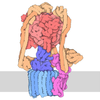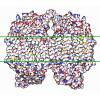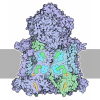[English] 日本語
 Yorodumi
Yorodumi- PDB-8apb: rotational state 1b of the Trypanosoma brucei mitochondrial ATP s... -
+ Open data
Open data
- Basic information
Basic information
| Entry | Database: PDB / ID: 8apb | ||||||
|---|---|---|---|---|---|---|---|
| Title | rotational state 1b of the Trypanosoma brucei mitochondrial ATP synthase dimer | ||||||
 Components Components |
| ||||||
 Keywords Keywords |  MEMBRANE PROTEIN / MEMBRANE PROTEIN /  ATP synthase / ATP synthase /  mitochondria mitochondria | ||||||
| Function / homology |  Function and homology information Function and homology information H+-transporting two-sector ATPase / H+-transporting two-sector ATPase /  Hydrolases; Acting on acid anhydrides; Acting on acid anhydrides to catalyse transmembrane movement of substances / Hydrolases; Acting on acid anhydrides; Acting on acid anhydrides to catalyse transmembrane movement of substances /  kinetoplast / ATP biosynthetic process / nuclear lumen / ciliary plasm / mitochondrial proton-transporting ATP synthase, stator stalk / mitochondrial proton-transporting ATP synthase complex, coupling factor F(o) / mitochondrial proton-transporting ATP synthase complex / mitochondrial proton-transporting ATP synthase complex, catalytic sector F(1) ... kinetoplast / ATP biosynthetic process / nuclear lumen / ciliary plasm / mitochondrial proton-transporting ATP synthase, stator stalk / mitochondrial proton-transporting ATP synthase complex, coupling factor F(o) / mitochondrial proton-transporting ATP synthase complex / mitochondrial proton-transporting ATP synthase complex, catalytic sector F(1) ... H+-transporting two-sector ATPase / H+-transporting two-sector ATPase /  Hydrolases; Acting on acid anhydrides; Acting on acid anhydrides to catalyse transmembrane movement of substances / Hydrolases; Acting on acid anhydrides; Acting on acid anhydrides to catalyse transmembrane movement of substances /  kinetoplast / ATP biosynthetic process / nuclear lumen / ciliary plasm / mitochondrial proton-transporting ATP synthase, stator stalk / mitochondrial proton-transporting ATP synthase complex, coupling factor F(o) / mitochondrial proton-transporting ATP synthase complex / mitochondrial proton-transporting ATP synthase complex, catalytic sector F(1) / proton motive force-driven mitochondrial ATP synthesis / proton-transporting ATP synthase complex, coupling factor F(o) / proton motive force-driven ATP synthesis / proton-transporting ATP synthase complex, catalytic core F(1) / kinetoplast / ATP biosynthetic process / nuclear lumen / ciliary plasm / mitochondrial proton-transporting ATP synthase, stator stalk / mitochondrial proton-transporting ATP synthase complex, coupling factor F(o) / mitochondrial proton-transporting ATP synthase complex / mitochondrial proton-transporting ATP synthase complex, catalytic sector F(1) / proton motive force-driven mitochondrial ATP synthesis / proton-transporting ATP synthase complex, coupling factor F(o) / proton motive force-driven ATP synthesis / proton-transporting ATP synthase complex, catalytic core F(1) /  H+-transporting two-sector ATPase / proton-transporting ATPase activity, rotational mechanism / proton transmembrane transport / proton-transporting ATP synthase activity, rotational mechanism / H+-transporting two-sector ATPase / proton-transporting ATPase activity, rotational mechanism / proton transmembrane transport / proton-transporting ATP synthase activity, rotational mechanism /  mitochondrial membrane / mitochondrial membrane /  mitochondrial inner membrane / mitochondrial inner membrane /  hydrolase activity / hydrolase activity /  lipid binding / lipid binding /  ATP hydrolysis activity / ATP hydrolysis activity /  mitochondrion / mitochondrion /  nucleoplasm / nucleoplasm /  ATP binding / ATP binding /  membrane / membrane /  cytoplasm cytoplasmSimilarity search - Function | ||||||
| Biological species |   Trypanosoma brucei brucei (eukaryote) Trypanosoma brucei brucei (eukaryote) | ||||||
| Method |  ELECTRON MICROSCOPY / ELECTRON MICROSCOPY /  single particle reconstruction / single particle reconstruction /  cryo EM / Resolution: 3.8 Å cryo EM / Resolution: 3.8 Å | ||||||
 Authors Authors | Muehleip, A. / Gahura, O. / Zikova, A. / Amunts, A. | ||||||
| Funding support | European Union, 1items
| ||||||
 Citation Citation |  Journal: Nat Commun / Year: 2022 Journal: Nat Commun / Year: 2022Title: An ancestral interaction module promotes oligomerization in divergent mitochondrial ATP synthases. Authors: Ondřej Gahura / Alexander Mühleip / Carolina Hierro-Yap / Brian Panicucci / Minal Jain / David Hollaus / Martina Slapničková / Alena Zíková / Alexey Amunts /   Abstract: Mitochondrial ATP synthase forms stable dimers arranged into oligomeric assemblies that generate the inner-membrane curvature essential for efficient energy conversion. Here, we report cryo-EM ...Mitochondrial ATP synthase forms stable dimers arranged into oligomeric assemblies that generate the inner-membrane curvature essential for efficient energy conversion. Here, we report cryo-EM structures of the intact ATP synthase dimer from Trypanosoma brucei in ten different rotational states. The model consists of 25 subunits, including nine lineage-specific, as well as 36 lipids. The rotary mechanism is influenced by the divergent peripheral stalk, conferring a greater conformational flexibility. Proton transfer in the lumenal half-channel occurs via a chain of five ordered water molecules. The dimerization interface is formed by subunit-g that is critical for interactions but not for the catalytic activity. Although overall dimer architecture varies among eukaryotes, we find that subunit-g together with subunit-e form an ancestral oligomerization motif, which is shared between the trypanosomal and mammalian lineages. Therefore, our data defines the subunit-g/e module as a structural component determining ATP synthase oligomeric assemblies. | ||||||
| History |
|
- Structure visualization
Structure visualization
| Structure viewer | Molecule:  Molmil Molmil Jmol/JSmol Jmol/JSmol |
|---|
- Downloads & links
Downloads & links
- Download
Download
| PDBx/mmCIF format |  8apb.cif.gz 8apb.cif.gz | 2.6 MB | Display |  PDBx/mmCIF format PDBx/mmCIF format |
|---|---|---|---|---|
| PDB format |  pdb8apb.ent.gz pdb8apb.ent.gz | Display |  PDB format PDB format | |
| PDBx/mmJSON format |  8apb.json.gz 8apb.json.gz | Tree view |  PDBx/mmJSON format PDBx/mmJSON format | |
| Others |  Other downloads Other downloads |
-Validation report
| Arichive directory |  https://data.pdbj.org/pub/pdb/validation_reports/ap/8apb https://data.pdbj.org/pub/pdb/validation_reports/ap/8apb ftp://data.pdbj.org/pub/pdb/validation_reports/ap/8apb ftp://data.pdbj.org/pub/pdb/validation_reports/ap/8apb | HTTPS FTP |
|---|
-Related structure data
| Related structure data |  15564MC  8ap6C  8ap7C  8ap8C 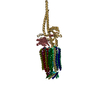 8ap9C 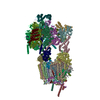 8apaC  8apcC 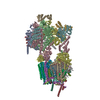 8apdC  8apeC  8apfC 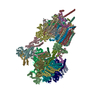 8apgC  8aphC  8apjC  8apkC M: map data used to model this data C: citing same article ( |
|---|---|
| Similar structure data | Similarity search - Function & homology  F&H Search F&H Search |
- Links
Links
- Assembly
Assembly
| Deposited unit | 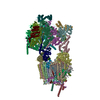
|
|---|---|
| 1 |
|
- Components
Components
-ATP synthase subunit ... , 5 types, 11 molecules A1B1C1D1E1F1I1J1K1L1a
| #1: Protein |  / ATP synthase F1 subunit alpha / ATP synthase F1 subunit alphaMass: 63574.465 Da / Num. of mol.: 3 / Source method: isolated from a natural source / Source: (natural)   Trypanosoma brucei brucei (eukaryote) / References: UniProt: Q9GS23 Trypanosoma brucei brucei (eukaryote) / References: UniProt: Q9GS23#2: Protein |  / ATP synthase F1 subunit beta / ATP synthase F1 subunit betaMass: 55836.879 Da / Num. of mol.: 3 / Source method: isolated from a natural source / Source: (natural)   Trypanosoma brucei brucei (eukaryote) Trypanosoma brucei brucei (eukaryote)References: UniProt: Q9GPE9,  H+-transporting two-sector ATPase H+-transporting two-sector ATPase#5: Protein | |  / ATP synthase F1 subunit epsilon / ATP synthase F1 subunit epsilonMass: 8706.890 Da / Num. of mol.: 1 / Source method: isolated from a natural source / Source: (natural)   Trypanosoma brucei brucei (eukaryote) / References: UniProt: P0DPG3 Trypanosoma brucei brucei (eukaryote) / References: UniProt: P0DPG3#6: Protein |  / ATP synthase F1 subunit p18 / ATP synthase F1 subunit p18Mass: 21268.279 Da / Num. of mol.: 3 / Source method: isolated from a natural source / Source: (natural)   Trypanosoma brucei brucei (eukaryote) / References: UniProt: P0DPG4 Trypanosoma brucei brucei (eukaryote) / References: UniProt: P0DPG4#11: Protein | |  / F-ATPase protein 6 / F-ATPase protein 6Mass: 28708.406 Da / Num. of mol.: 1 / Source method: isolated from a natural source / Source: (natural)   Trypanosoma brucei brucei (eukaryote) / References: UniProt: P24499 Trypanosoma brucei brucei (eukaryote) / References: UniProt: P24499 |
|---|
-Protein , 20 types, 31 molecules G1H1LlMmM1O1P1Q1R1S1T1U1V1W1X1cdefghijknopqr
| #3: Protein |  Mass: 34472.254 Da / Num. of mol.: 1 / Source method: isolated from a natural source / Source: (natural)   Trypanosoma brucei brucei (eukaryote) Trypanosoma brucei brucei (eukaryote)References: UniProt: A0A161CM65,  H+-transporting two-sector ATPase H+-transporting two-sector ATPase | ||||||||||||||||||||||||||||||||||
|---|---|---|---|---|---|---|---|---|---|---|---|---|---|---|---|---|---|---|---|---|---|---|---|---|---|---|---|---|---|---|---|---|---|---|---|
| #4: Protein | Mass: 20172.938 Da / Num. of mol.: 1 / Source method: isolated from a natural source / Source: (natural)   Trypanosoma brucei brucei (eukaryote) / References: UniProt: Q586H1 Trypanosoma brucei brucei (eukaryote) / References: UniProt: Q586H1 | ||||||||||||||||||||||||||||||||||
| #7: Protein | Mass: 10448.932 Da / Num. of mol.: 2 / Source method: isolated from a natural source / Source: (natural)   Trypanosoma brucei brucei (eukaryote) / Strain: 927/4 GUTat10.1 / References: UniProt: Q387J1 Trypanosoma brucei brucei (eukaryote) / Strain: 927/4 GUTat10.1 / References: UniProt: Q387J1#8: Protein | Mass: 16092.668 Da / Num. of mol.: 2 / Source method: isolated from a natural source / Source: (natural)   Trypanosoma brucei brucei (eukaryote) / Strain: MHOM/CI/86/DAL972 / References: UniProt: C9ZJA0 Trypanosoma brucei brucei (eukaryote) / Strain: MHOM/CI/86/DAL972 / References: UniProt: C9ZJA0#9: Protein | | Mass: 28869.924 Da / Num. of mol.: 1 / Source method: isolated from a natural source / Source: (natural)   Trypanosoma brucei brucei (eukaryote) / Strain: 927/4 GUTat10.1 / References: UniProt: Q38AG1 Trypanosoma brucei brucei (eukaryote) / Strain: 927/4 GUTat10.1 / References: UniProt: Q38AG1#10: Protein |  Mass: 12398.870 Da / Num. of mol.: 10 / Source method: isolated from a natural source / Source: (natural)   Trypanosoma brucei brucei (eukaryote) / Strain: 927/4 GUTat10.1 Trypanosoma brucei brucei (eukaryote) / Strain: 927/4 GUTat10.1References: UniProt: Q38C84,  H+-transporting two-sector ATPase H+-transporting two-sector ATPase#12: Protein | | Mass: 13750.958 Da / Num. of mol.: 1 / Source method: isolated from a natural source / Source: (natural)   Trypanosoma brucei brucei (eukaryote) / Strain: 927/4 GUTat10.1 / References: UniProt: Q585K5 Trypanosoma brucei brucei (eukaryote) / Strain: 927/4 GUTat10.1 / References: UniProt: Q585K5#13: Protein | | Mass: 43379.324 Da / Num. of mol.: 1 / Source method: isolated from a natural source / Source: (natural)   Trypanosoma brucei brucei (eukaryote) / Strain: 927/4 GUTat10.1 / References: UniProt: Q57ZW9 Trypanosoma brucei brucei (eukaryote) / Strain: 927/4 GUTat10.1 / References: UniProt: Q57ZW9#14: Protein | | Mass: 46883.637 Da / Num. of mol.: 1 / Source method: isolated from a natural source / Source: (natural)   Trypanosoma brucei brucei (eukaryote) / Strain: 927/4 GUTat10.1 / References: UniProt: Q38CI8 Trypanosoma brucei brucei (eukaryote) / Strain: 927/4 GUTat10.1 / References: UniProt: Q38CI8#15: Protein | | Mass: 17182.668 Da / Num. of mol.: 1 / Source method: isolated from a natural source / Source: (natural)   Trypanosoma brucei brucei (eukaryote) / Strain: 927/4 GUTat10.1 / References: UniProt: Q57ZE2 Trypanosoma brucei brucei (eukaryote) / Strain: 927/4 GUTat10.1 / References: UniProt: Q57ZE2#16: Protein | | Mass: 27646.643 Da / Num. of mol.: 1 / Source method: isolated from a natural source / Source: (natural)   Trypanosoma brucei brucei (eukaryote) / References: UniProt: A0A3L6KRX7 Trypanosoma brucei brucei (eukaryote) / References: UniProt: A0A3L6KRX7#17: Protein | | Mass: 17218.723 Da / Num. of mol.: 1 / Source method: isolated from a natural source / Source: (natural)   Trypanosoma brucei brucei (eukaryote) / Strain: 927/4 GUTat10.1 / References: UniProt: Q389Z3 Trypanosoma brucei brucei (eukaryote) / Strain: 927/4 GUTat10.1 / References: UniProt: Q389Z3#18: Protein | | Mass: 12661.607 Da / Num. of mol.: 1 / Source method: isolated from a natural source / Source: (natural)   Trypanosoma brucei brucei (eukaryote) / References: UniProt: Q57ZM4 Trypanosoma brucei brucei (eukaryote) / References: UniProt: Q57ZM4#19: Protein | | Mass: 20307.389 Da / Num. of mol.: 1 / Source method: isolated from a natural source / Source: (natural)   Trypanosoma brucei brucei (eukaryote) / Strain: MHOM/CI/86/DAL972 / References: UniProt: D0A5R7 Trypanosoma brucei brucei (eukaryote) / Strain: MHOM/CI/86/DAL972 / References: UniProt: D0A5R7#20: Protein | | Mass: 14531.121 Da / Num. of mol.: 1 / Source method: isolated from a natural source / Source: (natural)   Trypanosoma brucei brucei (eukaryote) / Strain: 927/4 GUTat10.1 / References: UniProt: Q57VT0 Trypanosoma brucei brucei (eukaryote) / Strain: 927/4 GUTat10.1 / References: UniProt: Q57VT0#21: Protein | | Mass: 17929.576 Da / Num. of mol.: 1 / Source method: isolated from a natural source / Source: (natural)   Trypanosoma brucei brucei (eukaryote) / Strain: 927/4 GUTat10.1 / References: UniProt: Q582T1 Trypanosoma brucei brucei (eukaryote) / Strain: 927/4 GUTat10.1 / References: UniProt: Q582T1#22: Protein | | Mass: 11676.294 Da / Num. of mol.: 1 / Source method: isolated from a natural source / Source: (natural)   Trypanosoma brucei brucei (eukaryote) / Strain: 927/4 GUTat10.1 / References: UniProt: Q57Z84 Trypanosoma brucei brucei (eukaryote) / Strain: 927/4 GUTat10.1 / References: UniProt: Q57Z84#23: Protein | | Mass: 12325.279 Da / Num. of mol.: 1 / Source method: isolated from a natural source / Source: (natural)   Trypanosoma brucei brucei (eukaryote) / Strain: MHOM/CI/86/DAL972 / References: UniProt: C9ZLR9 Trypanosoma brucei brucei (eukaryote) / Strain: MHOM/CI/86/DAL972 / References: UniProt: C9ZLR9#24: Protein | | Mass: 12293.796 Da / Num. of mol.: 1 / Source method: isolated from a natural source / Source: (natural)   Trypanosoma brucei brucei (eukaryote) / Strain: 927/4 GUTat10.1 / References: UniProt: Q583U4 Trypanosoma brucei brucei (eukaryote) / Strain: 927/4 GUTat10.1 / References: UniProt: Q583U4#25: Protein | | Mass: 7649.776 Da / Num. of mol.: 1 / Source method: isolated from a natural source / Source: (natural)   Trypanosoma brucei brucei (eukaryote) Trypanosoma brucei brucei (eukaryote) |
-Sugars , 1 types, 2 molecules 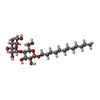
| #33: Sugar |
|---|
-Non-polymers , 8 types, 34 molecules 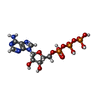

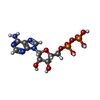
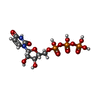
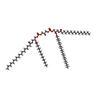
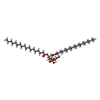
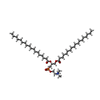








| #26: Chemical | ChemComp-ATP /  Adenosine triphosphate Adenosine triphosphate#27: Chemical | ChemComp-MG / #28: Chemical | ChemComp-ADP / |  Adenosine diphosphate Adenosine diphosphate#29: Chemical | ChemComp-UTP / |  Uridine triphosphate Uridine triphosphate#30: Chemical | ChemComp-CDL /  Cardiolipin Cardiolipin#31: Chemical |  Phosphatidylethanolamine Phosphatidylethanolamine#32: Chemical | ChemComp-PC1 /  Phosphatidylcholine Phosphatidylcholine#34: Chemical | |
|---|
-Details
| Has ligand of interest | Y |
|---|
-Experimental details
-Experiment
| Experiment | Method:  ELECTRON MICROSCOPY ELECTRON MICROSCOPY |
|---|---|
| EM experiment | Aggregation state: PARTICLE / 3D reconstruction method:  single particle reconstruction single particle reconstruction |
- Sample preparation
Sample preparation
| Component | Name: mitochondrial ATP synthase dimer from Trypanosoma brucei Type: COMPLEX / Entity ID: #1-#25 / Source: NATURAL |
|---|---|
| Molecular weight | Experimental value: NO |
| Source (natural) | Organism:   Trypanosoma brucei brucei (eukaryote) / Strain: Lister427 / Organelle Trypanosoma brucei brucei (eukaryote) / Strain: Lister427 / Organelle : Mitochondrion : Mitochondrion |
| Buffer solution | pH: 8 |
| Specimen | Embedding applied: NO / Shadowing applied: NO / Staining applied : NO / Vitrification applied : NO / Vitrification applied : YES : YES |
| Specimen support | Grid material: GOLD / Grid mesh size: 300 divisions/in. / Grid type: Quantifoil R1.2/1.3 |
Vitrification | Cryogen name: ETHANE / Humidity: 100 % |
- Electron microscopy imaging
Electron microscopy imaging
| Experimental equipment |  Model: Titan Krios / Image courtesy: FEI Company |
|---|---|
| Microscopy | Model: FEI TITAN KRIOS |
| Electron gun | Electron source : :  FIELD EMISSION GUN / Accelerating voltage: 300 kV / Illumination mode: FLOOD BEAM FIELD EMISSION GUN / Accelerating voltage: 300 kV / Illumination mode: FLOOD BEAM |
| Electron lens | Mode: BRIGHT FIELD Bright-field microscopy / Nominal defocus max: 3200 nm / Nominal defocus min: 1600 nm / Alignment procedure: COMA FREE Bright-field microscopy / Nominal defocus max: 3200 nm / Nominal defocus min: 1600 nm / Alignment procedure: COMA FREE |
| Specimen holder | Cryogen: NITROGEN / Specimen holder model: FEI TITAN KRIOS AUTOGRID HOLDER / Temperature (max): 70 K / Temperature (min): 70 K |
| Image recording | Electron dose: 33 e/Å2 / Detector mode: COUNTING / Film or detector model: GATAN K2 QUANTUM (4k x 4k) |
- Processing
Processing
CTF correction | Type: PHASE FLIPPING AND AMPLITUDE CORRECTION |
|---|---|
3D reconstruction | Resolution: 3.8 Å / Resolution method: FSC 0.143 CUT-OFF / Num. of particles: 16991 / Algorithm: FOURIER SPACE / Symmetry type: POINT |
 Movie
Movie Controller
Controller


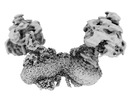












 PDBj
PDBj
